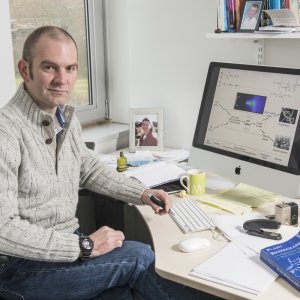Professor Richard J Morris
Group Leader Building Robustness in Crops (BRiC), Advancing Plant Health (APH)
Plants adapt to their environment.
In order to do so they continuously monitor their surroundings and encode relevant information into cellular signals which are used to trigger appropriate responses.
The Morris lab are interested in how plants carry out this information processing to guide their responses to external challenges.
In close collaboration with experimental groups they develop mathematical and computational approaches based on physical processes to provide mechanistic insights in complex phenomena. The group use whichever approaches are the most appropriate to the problem they’re investigating.
The lab are interested in how plants encode, transmit and decode information about their environment. They develop and use mathematical modelling and computational approaches to answer questions about the mechanistic basis of information flow and signalling.
Current questions of interest include:
1) How plants process information about temperature and day length to influence developmental transitions
2) How plants signal from cell to cell during pathogen attack (in collaboration with Dr Christine Faulkner)
3) How plants process information on nutrient availability to fine-tune development (in collaboration with Fritz Kragler and Julia Kehr)
Selected Publications
-
Calderwood A,Lloyd A,Hepworth J,Tudor EH,Jones DM,Woodhouse S,Bilham L,Chinoy C,Williams K,Corke F,Doonan JH,Ostergaard L,Irwin JA,Wells R,Morris RJ (2021)Total FLC transcript dynamics from divergent paralogue expression explains flowering diversity in Brassica napus.The New phytologistPublisher's version: 0028-646X
-
Woolfenden H. C., Bourdais G., Kopischke M., Miedes E., Molina A., Robatzek S., Morris R. J. (2017)A computational approach for inferring the cell wall properties that govern guard cell dynamics.Plant Journal (92)Publisher's version: 0960-7412
-
Evans M. J., Choi W. G., Gilroy S., Morris R. J. (2016)A ROS-Assisted Calcium Wave Dependent on the AtRBOHD NADPH Oxidase and TPC1 Cation Channel Propagates the Systemic Response to Salt Stress.Plant Physiology (171)Publisher's version: 0032-0889
